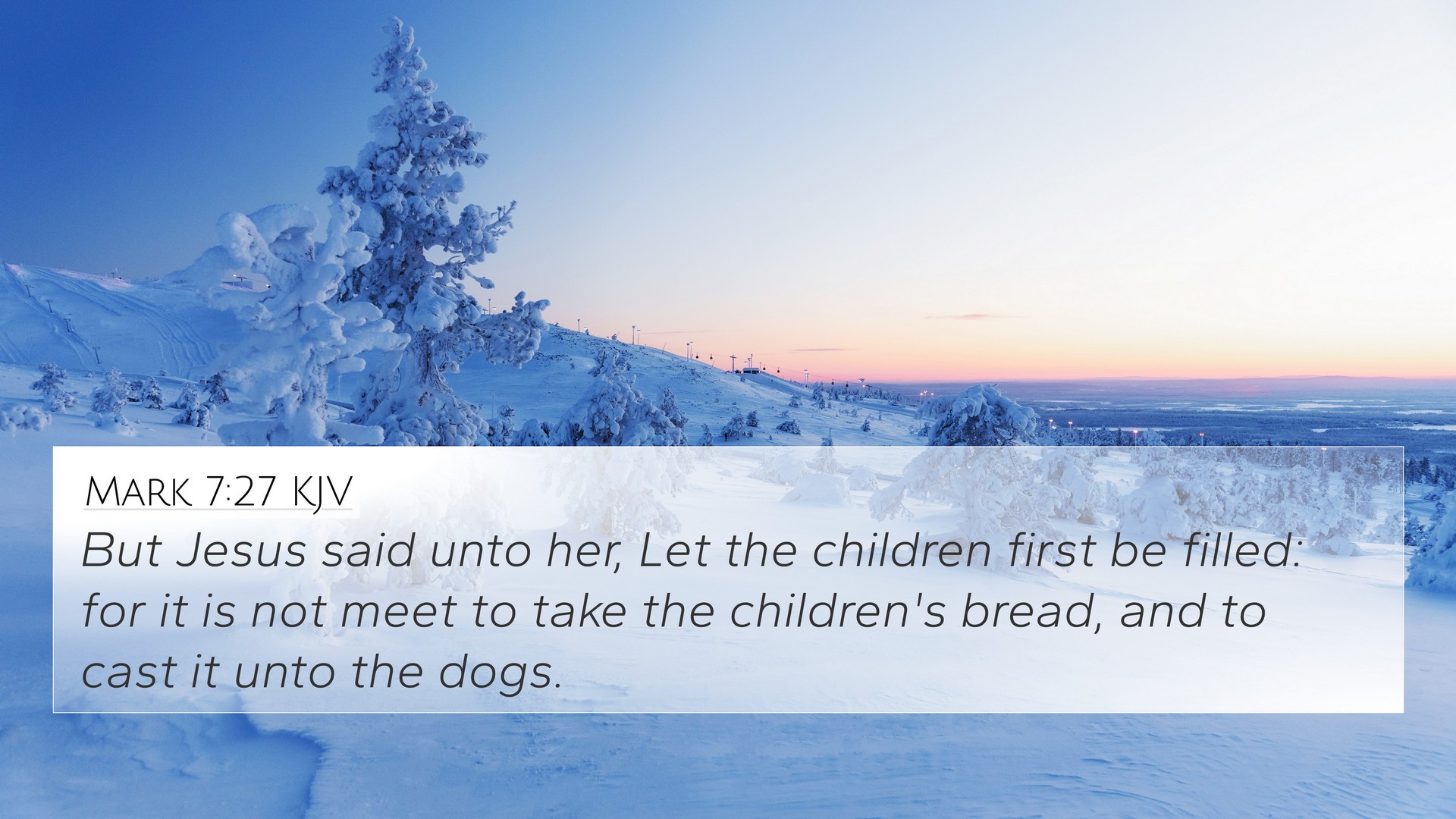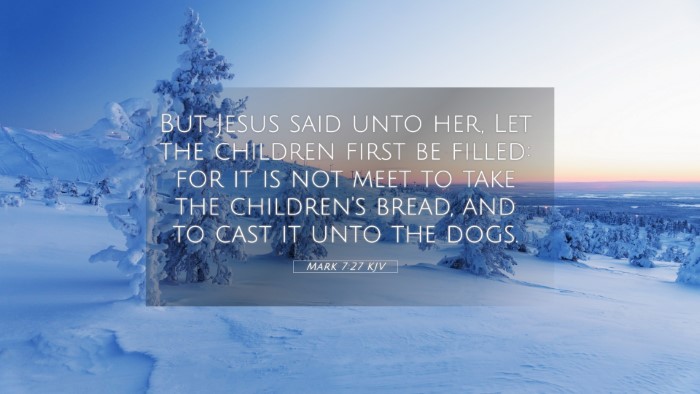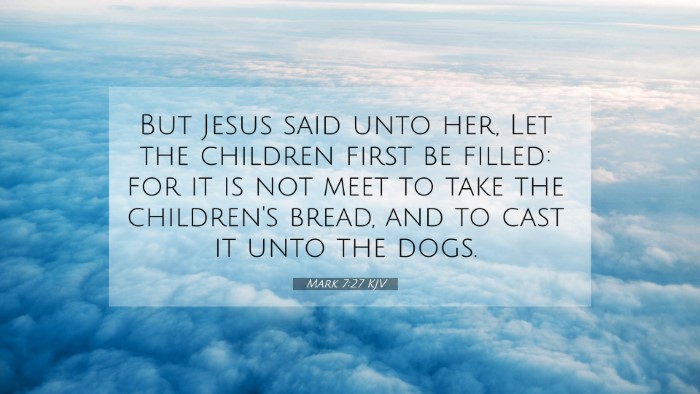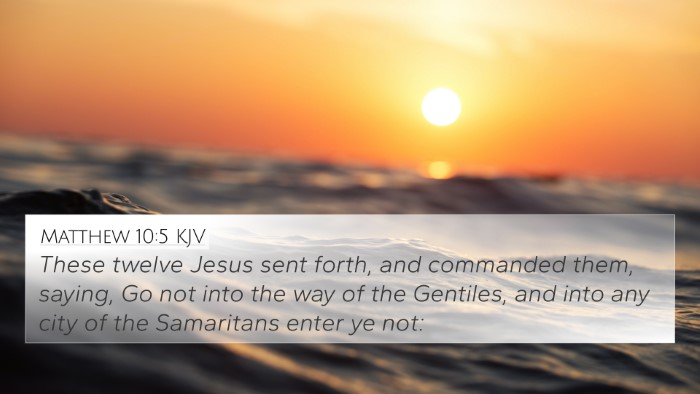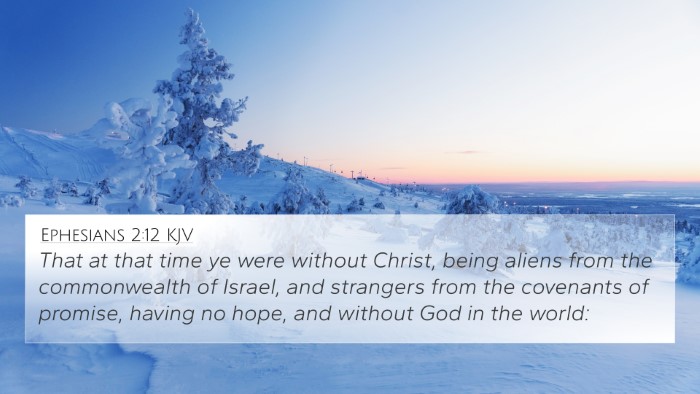Understanding Mark 7:27
Mark 7:27 states: “But Jesus said to her, ‘Let the children be filled first, for it is not good to take the children’s bread and throw it to the little dogs.’” This verse unfolds within the context of Jesus' interaction with a Gentile woman, which stimulates significant theological insights regarding inclusion, faith, and the broader mission of Jesus.
Summary of Interpretations
The core meaning of Mark 7:27 can be interpreted through various perspectives drawn from public domain commentaries. Below, I consolidate insights from Matthew Henry, Albert Barnes, and Adam Clarke.
- Matthew Henry: He emphasizes that the metaphor of "children's bread" represents the blessings of divine grace intended initially for the Jews. Henry interprets the term "little dogs" not as a derogatory label but as a reference to Gentiles, suggesting that the blessings meant for Israel will eventually extend to others.
- Albert Barnes: Barnes elaborates on the fact that Jesus’ words indeed reflect a priority in His ministry. He stresses that the mission to the Jews, as God's chosen people, is foundational, and through this dialogue, Jesus acknowledges the woman's faith, which transcends cultural boundaries, thereby foreshadowing the inclusion of Gentiles in salvation.
- Adam Clarke: Clarke indicates that the usage of "dogs" should be interpreted with a degree of cultural understanding. While this term could sound harsh, he notes that it reveals the reality of Israel's preferential treatment. However, he highlights the woman's quick-witted response and faith which Jesus ultimately commends.
Thematic Connections and Cross-References
Mark 7:27 can be connected with various other Bible verses that illuminate its meaning, providing a rich tapestry of theological reflection. Here are some key cross-references that display the connections between Bible verses:
- Matthew 15:26-27: This passage parallels Mark 7:27 closely, illustrating Jesus’ words to a Canaanite woman, highlighting the theme of faith and outreach beyond the Jewish community.
- John 4:22: Jesus tells the Samaritan woman, “You worship what you do not know; we know what we worship, for salvation is of the Jews,” reinforcing the idea of God’s initial covenant with Israel.
- Romans 1:16: “For I am not ashamed of the gospel of Christ, for it is the power of God to salvation for everyone who believes, for the Jew first and also for the Greek,” which emphasizes the order of outreach missions.
- Galatians 3:28: “There is neither Jew nor Greek, slave nor free, male nor female, for you are all one in Christ Jesus,” highlighting the eventual equality brought by faith, bridging gaps established by cultural background.
- Luke 13:29: This verse predicts that people will come from the east and the west to take their places in the kingdom of God, illustrating the expansion of God's grace to all nations.
- Acts 15:9: This recounts how God made no distinction between Jews and Gentiles, cleansing their hearts through faith, affirming that God’s grace is universal.
- Philippians 3:3: Paul emphasizes that those who worship by the Spirit of God do so without regard for heritage, echoing the themes found in the interaction of Jesus with the Gentile woman.
- Revelation 7:9: This vision of a multitude from every tribe, nation, and language worshiping God depicts the ultimate fulfillment of Jesus' initial intention of outreach beyond Israel.
Insights from Comparative Bible Analysis
The comparative study of biblical verses aids in understanding the underlying themes of exclusivity versus universality of God's grace. Mark 7:27 serves as a pivot for understanding how Jesus' ministry to the Jews lays the groundwork for the inclusive movement that would later characterize the early church.
In applying tools for Bible cross-referencing, such as a Bible concordance and systematic cross-reference guide, scholars and believers can better discern how verses interrelate. For example, examining the connection between Mark 7:27 and Matthew 15 reinforces a consistent theme of faith overcoming cultural and ethnic barriers.
Faith's Role in Jesus' Teaching
The sincere faith of the Gentile woman in Mark 7:27 demonstrates a critical aspect of Jesus' mission. Her response to Jesus showcases how genuine faith can transcend societal norms and expectations, prompting a reevaluation of the scope of God’s blessings.
Conclusion
Mark 7:27 presents profound theological insights regarding the dynamics of faith, grace, and the mission of Jesus. By engaging with various public domain commentaries and exploring biblical cross-references, we can appreciate the complex interactions at play within this verse. Ultimately, it serves as a reflection of the broader inclusiveness of God's love extending to all nations, much in line with the teachings throughout the New Testament.
Further Study
For those interested in delving deeper, engaging in cross-referencing Bible study methods can illuminate further parallels and themes, encouraging a comprehensive understanding of how individual verses gather meaning in the grand narrative of scripture.
